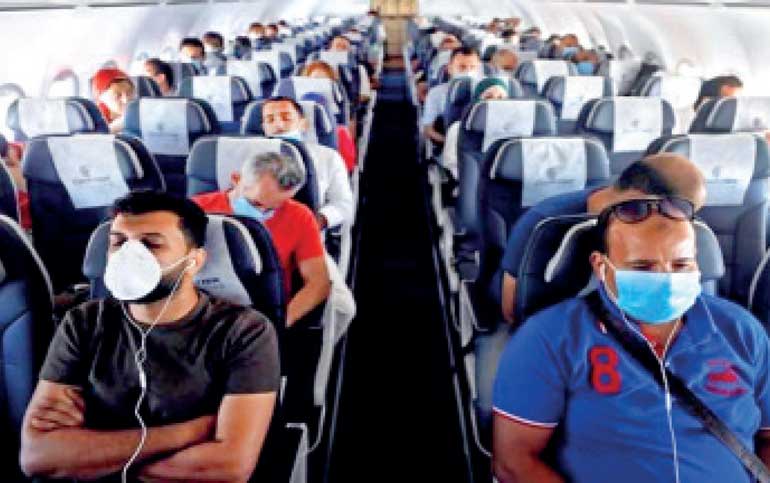Friday Feb 13, 2026
Friday Feb 13, 2026
Monday, 14 June 2021 00:00 - - {{hitsCtrl.values.hits}}

Until Asian governments snap out of their lethargy and conduct mass vaccinations, with booster shots as required, confidence in travel is unlikely to return for a long time
 The first of these columns to report on COVID-19 was published in February 2019. Sixteen months later the nightmare isn’t showing any signs of ending soon.
The first of these columns to report on COVID-19 was published in February 2019. Sixteen months later the nightmare isn’t showing any signs of ending soon.
In February of last year China was a country in a harsh lockdown, one that most of the world was quick to criticise as too extreme. Today, life in China is almost back to ‘normal’, and the wisdom of those severe measures has been proved. Much of the ‘free world’, however, refused to take such severe steps, and consequently paid a terrible price.
Worldwide mortality from COVID-19 is officially quoted as 3.7 million at the time of writing. But with many uncounted deaths in the ‘Global South’, the actual toll is likely to be much higher. As happened during the 1918 Influenza epidemic, deaths have come in two waves, with the second being worse than the first. If history is a guide there will be a third wave too, though vaccinations may make this a lot less severe.
The mythical V-shaped recovery
Some airline managers were ridiculously optimistic a year ago, foreseeing a ‘V-shaped’ recovery with demand springing back in a few months. The more thoughtful disagreed and took drastic steps: grounding aircraft; downsizing their companies; hoarding cash; and raising capital. In the latter examples, the pessimists were proved correct, with the airline industry showing no signs of an early recovery.
This column forecast that domestic traffic in countries that handled the pandemic well, would be the first to recover. That prediction has been vindicated, as Chinese domestic traffic recovered quickly, reflecting that nation’s handling of the pandemic. Spring Airlines, a predominantly domestic carrier based in Shanghai, has performed well, even generating profits (at EBIT level) in the last two quarters of 2019, only to see another sharp fall in Q1/2021 as COVID infections rose and travel was restricted by the government over the busy Lunar New Year period.
With China’s international borders practically closed, the Big Three (Air China, China Eastern and China Southern) have all reported losses for the financial year according to aviation finance consultancy Ishka. Traffic in the USA went into free fall during the worst days of the pandemic but has been slowly recovering as vaccinations continue to blunt the spread of the virus. Most US airlines expect that traffic over the summer peak season will be around 90% of 2019 levels, though international travel is still badly affected.
Interestingly, travel between the USA and its southern neighbours has been healthy, with US-Mexico passenger numbers even showing a 10% increase as of May 2021 (Ishka). However, the US Federal Aviation Administration (FAA) has downgraded the safety rating of Mexico’s airline regulator, which may complicate this nascent recovery while preventing Mexican carriers from adding frequencies to the USA.
Whither Asia’s dinosaurs?
Asia is home to many ‘dinosaurs’: huge, bloated national airlines that haven’t been profitable for decades, saddled with legacy costs, inappropriate fleets, venal unions and corrupt managers. The pandemic has brought them to their knees, but they seem to be struggling on despite worsening finances. How their respective national governments can keep funding these perennial loss-makers is a mystery that seemingly lacks an answer.
Air India, the grandaddy of the dinosaurs though once a proud, profitable flag-carrier, was on the cusp of privatisation a year ago. Whether India’s crippling second wave of infections has delayed this further is not easy to verify. Both Indigo and SpiceJet, privately-owned, largely domestic carriers based in India, have reported significant cutbacks as COVID’s second wave continues to dent confidence in the sub-continent.
Thai Airways has filed for bankruptcy and halved its workforce, as Thailand too reels from a resurgent pandemic. Malaysia Airlines, already in trouble prior to the pandemic despite a $ 1 billion rescue attempt by the government (its sole owner), has cut flights by 90% and does not see any change in the immediate future. Interestingly though, the airline has prevailed in a court battle in London against aircraft lessors, allowing the company to apply UK bankruptcy laws to restructure its aircraft leases although based in Malaysia. With almost all aircraft lease contracts subject to British law, this could be an interesting precedent for the entire industry.
Singapore Airlines, reliably profitable for decades and the poster boy of the island state’s vaunted business acumen, reported a 98% drop in passengers carried in the 12 months to March 2021. The airline has relied on cargo, mostly transported in the belly holds of its empty passenger aircraft (cabin load factors were reported at a lowly 13%), and a massive equity infusion by the government, to remain in business.
What will Summer 2021 bring?
Any hopes of a partial recovery by the summer travel season of 2021 now appear futile. Even winter 2021 is unlikely to bring a reprieve as the pandemic takes a horrible toll in the Global South. Until Asian governments snap out of their lethargy and conduct mass vaccinations, with booster shots as required, confidence in travel is unlikely to return for a long time. While most of Asia remains unvaccinated, the virus will continue evolving and a devastating third wave is extremely likely.
Melbourne’s recent two-week lockdown, its fourth since March 2020, has been traced to an inbound passenger from Sri Lanka who was carrying the ‘beta’ version of the virus and infected others. This type of cross-border contamination will only increase as large portions of the world’s population remain unvaccinated and cause major impediments to travel.
Whether mass vaccinations will be sufficient to achieve ‘herd immunity’, which is estimated as when around 70-80% of the population has been exposed to infection, is hard to say. Without the confidence that they will not be exposed to yet another unknown strain of COVID-19, even fully-vaccinated travellers will be hesitant to head for locations known to harbour the virus.
My friend Malcolm Gladwell, author of the non-fiction bestseller ‘Outliers: The Story of Success’ and other titles that make equally compelling reading, is one of the few optimists around these days. He saw the impact of COVID-19 first-hand, from New York, through the worst of the pandemic. But Malcolm remains hopeful, and also believes our recent experiences might have given us the tools we need to survive climate change. “It’s restored our faith in science,” he says. “It’s restored our faith in collective action. It’s reminded us that good government really matters, and lousy government screws you up. We’re going to need all these three.”